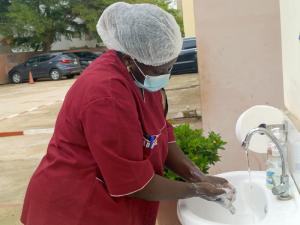Senegal: transforming health facilities into safe places for clients
Dakar – In Senegal, as in most countries in the African region, hospital-acquired infections are a major challenge. Also known as nosocomial infections, they are among the most frequently observed adverse events in the context of health service delivery. According to estimates from World Health Organization (WHO), in high-income countries seven out of 100 patients hospitalized in intensive care will contract at least one nosocomial infection during their stay in hospital. In low- or middle-income countries this number rises to 15.
The results of a global survey on national infection prevention and control (IPC) programmes, conducted by WHO in 2021–2022, indicate that 42.5% of countries in the African region did not have a dedicated IPC programme, or had one that was not implemented. This explained the high rates of COVID-19 infection among health care workers, according to the survey report.
To improve the situation, the WHO Regional Office for Africa is supporting 11 countries in the region (Chad, Côte d'Ivoire, Guinea, Lesotho, Madagascar, Mali, Namibia, Rwanda, Senegal, South Sudan, Togo) to strengthen the implementation of essential IPC components using a stepwise approach tailored to local needs.
According to the latest survey on the prevalence of health care-associated infections conducted in Senegal in 2018, 6% of the infections recorded were nosocomial. "Previously, we did not realize that our work was important for a hospital. We thought that we had nothing to do with the health of the patients and that it depended solely on the doctors," says Fatou, a cleaner at the Saint-Louis Regional Hospital. "We were endangering our lives as well as those of the patients, without knowing it."
Audits conducted by the Senegalese Government and WHO revealed deficiencies in compliance with sanitation measures in health facilities, such as performance of hand hygiene by doctors and proper cleaning of infrastructure by support staff. These shortcomings were noted in all services, including those where patients are most vulnerable, such as geriatrics, the unit that provides care for older people.
To tackle the issue, a number of initiatives were implemented to enhance the country's IPC capacity. The approach, supported by WHO, is to strengthen basic and advanced IPC training and to develop a national action plan for each country.
"WHO places great importance on patient protection within health care facilities. Hospital-acquired infections complicate patient care and put health care workers at risk. They are a hindrance to the successful conduct of actions aimed at strengthening our health systems that are already weakened by other factors," emphasizes Dr Jean Marie Vianny Yameogo, WHO Representative in Senegal.
With the support of the Multi-Partner Trust Fund, the Directorate of Quality, Safety and Hospital Hygiene (DQSHH) of Senegal in 2021 and 2022 trained 80% of health providers and more than 430 cleaners across the country. These trainings focused on infection prevention and control strategies, biomedical waste management, and biological cleaning, based on the integrated "One Health" approach, which takes into account the interactions between human, animal, and environmental health.
"We used the opportunity to raise awareness among doctors on strict adherence to standards for their own survival and that of patients," explains Dr Ndella Konaté, Director of DQSHH. “The training workshops had a significant impact in terms of strengthening IPC strategies in our health care facilities.”
A little over a year after the training, assessments conducted with the use of the WHO IPC assessment tool (IPCAT) showed that 63% of the facilities whose staff were trained, improved their infection prevention practices, moving from a low level to a high level.
Beyond these quantitative results, these capacity enhancements have led to a change in mindset among cleaners and doctors. “These trainings have been crucial for improving our skills in IPC and ensuring high-quality care. Neglecting IPC leads to infections, and if they are resistant to antimicrobials, it can be fatal," says Dr Maimouna Sarr, a physician in the geriatrics department at the Fann Hospital Centre.
IPC is important in a geriatric ward, where patients are often more vulnerable due to their age and comorbidities. These training initiatives have significantly improved patient safety. “Before, I was not aware of the risks of infection in the hospital, but now I see those nurses, doctors, and even cleaning staff are taking extra precautions to protect us. I am greatly reassured to know that my health is taken seriously and that everything is done to prevent infections," says Mamadou Fall, 75, a patient at Fann Hospital.
The cleaning staff are now aware of the impact of their work on patients' health. "We have understood that in a health care facility, we can be the source of nosocomial infection and that we must be involved as persons who have a stake in the health security of patients," emphasizes Fatou. "Now, we know our role in public health. We feel protected, valued and determined to contribute to the proper healing of patients."
Communications Officer
Regional Office for Africa
Email: lawsonagbluluf [at] who.int (lawsonagbluluf[at]who[dot]int)
Chargée de Communication
OMS Sénégal
Email : sallai [at] who.int (sallai[at]who[dot]int)



